synchronized wait notify 生产者消费者
1.生产者消费者模型
public class ProducterConsumerTest{
public static void main(String[] args){
System.out.println("this is a test...");
Message msg=new Message();
Producter pro=new Producter(msg);
Consumer con=new Consumer(msg);
new Thread(pro).start();
new Thread(con).start();
new Thread(con).start();
}
}
class Message {
String title;
String content;
public synchronized void set(String title,String content){
//问题1:while 还是 if
while (this.content!=null){
try{
this.wait();
}catch(Exception exc){}
}
//模拟延迟
try{
Thread.sleep(100);
}catch(Exception exc){}
this.title=title;
this.content=content;
System.out.println(Thread.currentThread().getName()+"-生产:"+this.title+this.content);
//问题2 notify 还是notifyAll
super.notify();
}
public synchronized void get(){
//问题1:while 还是 if
while(this.content==null){
try{
this.wait();
}catch(Exception exc){}
}
//模拟延迟
try{
Thread.sleep(100);
}catch(Exception exc){}
System.out.println(Thread.currentThread().getName()+"-消费:"+this.title+this.content);
this.title=null;
this.content=null;
//问题2 notify 还是notifyAll
super.notify();
}
}
class Producter implements Runnable {
Message msg;
public Producter(Message msg){
this.msg=msg;
}
@Override
public void run(){
for(int i=0;i<10;i++){
msg.set("华为"," Meate100");
}
}
}
class Consumer implements Runnable{
Message msg;
public Consumer(Message msg){
this.msg=msg;
}
@Override
public void run(){
for(int i=0;i<5;i++){
msg.get();
}
}
}
//运行结果(notifyAll()+while):
this is a test...
生产:华为 Meate100
消费:华为 Meate100
生产:华为 Meate100
消费:华为 Meate100
生产:华为 Meate100
消费:华为 Meate100
生产:华为 Meate100
消费:华为 Meate100
生产:华为 Meate100
消费:华为 Meate100
2.Entry Set(锁池)、Wait Set(等待池)
对于Entry Set:如果线程A已经持有了对象锁,此时有其他线程也想获得该对象锁的话,它只能进入Entry Set,并且线程处于BLOCKED状态。
对于Wait Set:如果线程A调用了wait()方法,那么线程A会释放该对象的锁,进入到Wait Set,并且线程处于WAITING状态。
3.Wait、Notify、NotifyAll 、Entry Set(锁池)、Wait Set(等待池)画图说明
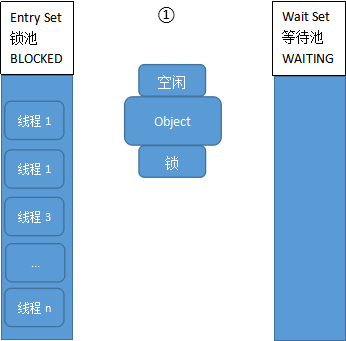
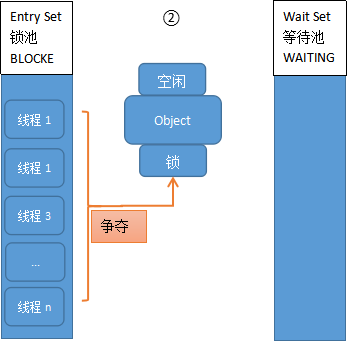
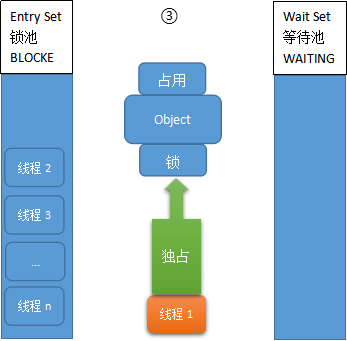
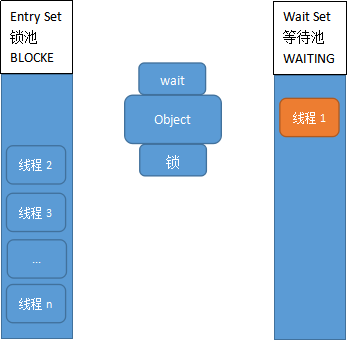
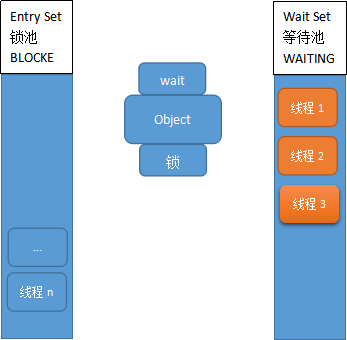
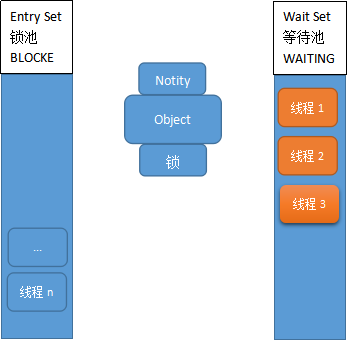
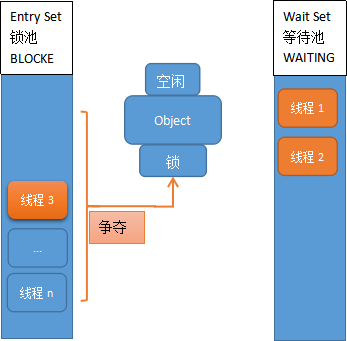
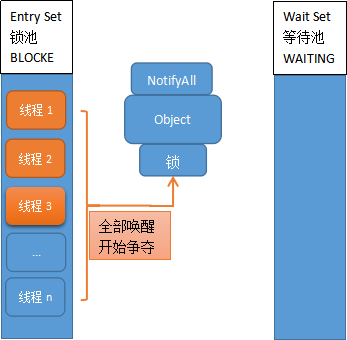
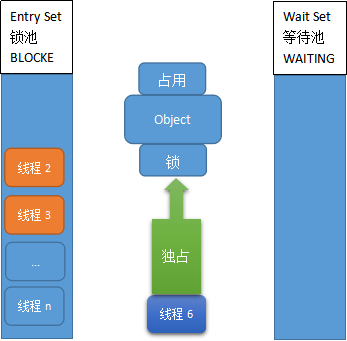
4.衍生出的问题
A.用notify还是notifyAll:
线程1-生产
线程2-消费 -waiting
线程3-消费 -waiting
notify场景分析:
步骤一:线程1生产完成后wait(),执行notify()随机唤醒一个是线程2,判断之后满足条件,进行消费,线程2消费完后wait(),执行notify().
此时三个线程状态是
线程1-waiting
线程2-waiting-执行notify
线程3-waiting
步骤二:这是如果唤醒的是线程3,那么是不满足消费条件的,所以线程3继续wait(),而没有进行唤醒操作
这是问题产生了
线程1-waiting
线程2-waiting
线程3-waiting
死锁、死锁、死锁了...

如果我们用的是notifyAll(),那么步骤一线程2消费完成后,执行notifyAll(),结果是什么呢?
(1)如果是线程1抢到锁,满足条件,进行生产,生产完成后notifyAll()
(2)如果是线程3抢到锁,不满足条件,线程3wait(),释放锁,此时只有线程1是在锁池中,线程1会抢到锁,之后执行(1)
so,notify会导致死锁问题,最好使用notifyAll()
B.wait外层用while还是if:
notifyAll下if运行结果:
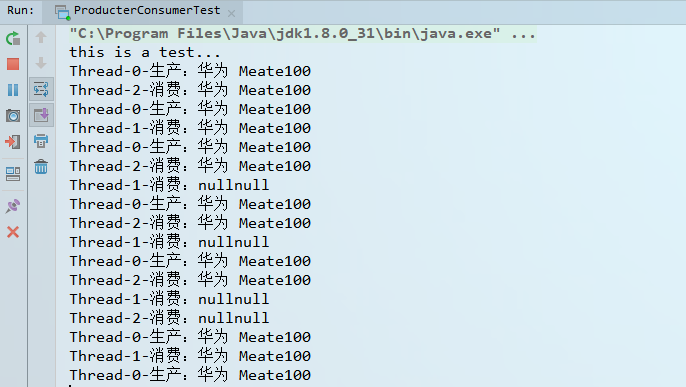
这里我没想明白,明明是同步方法为啥子会出现这个问题呢?
或者
就是当线程被wait之后进入等待队列,当被唤醒时,线程是继续往wait下面继续执行还是从synchronized monitor锁的地方再次执行?
答案只有一个:
上边的异常说明了->【wait被唤醒后,会继续往wait之后的代码执行而不是重新从monitor同步块处执行】 (这个结论是从代码运行推断,能力有限,没找到佐证,留待后续补充吧...........)
附上JDK中的说明

C.wait和synchronized绑定使用:
同上图



 浙公网安备 33010602011771号
浙公网安备 33010602011771号